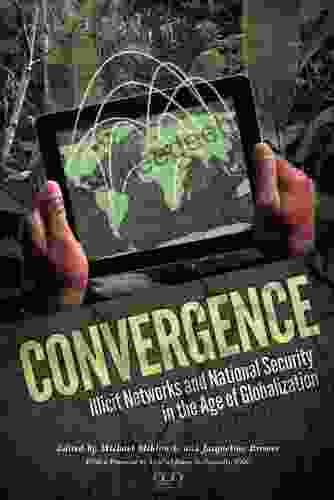Illicit Networks and National Security in the Age of Globalization

Globalization has brought about a number of challenges to national security. One of the most pressing of these challenges is the rise of illicit networks. These networks are involved in a wide range of illegal activities, including drug trafficking, human trafficking, money laundering, and terrorism. They are often transnational in nature, operating across borders and exploiting the weaknesses of national and international law enforcement systems.
4.3 out of 5
| Language | : | English |
| File size | : | 1181 KB |
| Text-to-Speech | : | Enabled |
| Screen Reader | : | Supported |
| Enhanced typesetting | : | Enabled |
| Word Wise | : | Enabled |
| Print length | : | 303 pages |
| Lending | : | Enabled |
| X-Ray for textbooks | : | Enabled |
Illicit networks can pose a serious threat to national security. They can undermine the rule of law, corrupt public institutions, and destabilize entire regions. Drug trafficking, for example, can lead to increased crime rates, violence, and addiction. Human trafficking can lead to the exploitation of vulnerable people and the spread of disease. Money laundering can help criminals to hide their assets and finance illicit activities. And terrorism can cause mass casualties and damage critical infrastructure.
The rise of illicit networks is a complex issue with no easy solutions. However, there are a number of steps that can be taken to address this threat. These include:
- Strengthening law enforcement cooperation
- Improving border security
- Cracking down on money laundering
- Investing in intelligence and technology
- Promoting economic development
- Addressing the root causes of crime
By taking these steps, we can help to reduce the threat posed by illicit networks and safeguard our national security.
The Forms of Illicit Networks
Illicit networks can take a variety of forms. Some of the most common types include:
- Drug trafficking networks are involved in the cultivation, production, and distribution of illegal drugs. These networks are often highly organized and can operate across multiple countries. They can also be linked to other criminal activities, such as money laundering and violence.
- Human trafficking networks are involved in the recruitment, transportation, and exploitation of people for forced labor, sexual exploitation, and other forms of abuse. These networks can be particularly harmful to women and children, who are often the most vulnerable to exploitation.
- Money laundering networks are involved in the process of concealing the origins of illegally obtained money. These networks can use a variety of methods to launder money, including shell companies, offshore bank accounts, and complex financial transactions.
- Terrorist networks are involved in the planning and execution of terrorist attacks. These networks can be domestic or international in scope, and they can have a wide range of motivations, including political, religious, or ideological goals.
- Cybercrime networks are involved in the use of computers and the internet to commit crimes. These networks can be involved in a wide range of activities, including hacking, identity theft, and fraud.
Illicit networks can be highly sophisticated and difficult to detect. They often use encrypted communication methods, operate in multiple jurisdictions, and have access to significant financial resources. This makes it difficult for law enforcement and intelligence agencies to track and disrupt their activities.
The Impact of Illicit Networks on National Security
Illicit networks can have a significant impact on national security. They can:
- Undermine the rule of law by corrupting public officials and institutions.
- Destabilize entire regions by fueling conflict and violence.
- Cause mass casualties and damage critical infrastructure.
- Harm the economy by diverting resources away from legitimate businesses and creating a climate of fear and uncertainty.
- Damage the reputation of a country by associating it with crime and violence.
The threat posed by illicit networks is a serious one. It is a threat that must be addressed by governments, law enforcement agencies, and the international community as a whole.
The Challenges of Combating Illicit Networks
Combating illicit networks is a complex challenge. These networks are often well-organized and have access to significant financial resources. They also operate in a globalized world, which makes it difficult for law enforcement and intelligence agencies to track and disrupt their activities.
There are a number of challenges that must be overcome in order to effectively combat illicit networks. These challenges include:
- Lack of coordination between law enforcement agencies
- Weak border security
- Inadequate intelligence
- Limited resources
- Political corruption
Despite these challenges, there are a number of steps that can be taken to address this threat. These steps include:
- Strengthening law enforcement cooperation by sharing information and resources, and coordinating investigations.
- Improving border security by investing in technology and personnel, and by working with neighboring countries to combat cross-border crime.
- Cracking down on money laundering by enacting strong laws and regulations, and by working with financial institutions to identify and report suspicious transactions.
- Investing in intelligence and technology to track and disrupt illicit networks.
- Promoting economic development to address the root causes of crime.
- Addressing the root causes of crime by providing education and job training, and by promoting social justice.
By taking these steps, we can help to reduce the threat posed by illicit networks and safeguard our national security.
Illicit networks are a serious threat to national security. They can undermine the rule of law, destabilize entire regions, and cause mass casualties. They can also damage the economy and harm the reputation of a country.
Combating illicit networks is a complex challenge. It requires a coordinated effort by governments, law enforcement agencies, and the international community. By working together, we can help to reduce the threat posed by these networks and safeguard our national security.
4.3 out of 5
| Language | : | English |
| File size | : | 1181 KB |
| Text-to-Speech | : | Enabled |
| Screen Reader | : | Supported |
| Enhanced typesetting | : | Enabled |
| Word Wise | : | Enabled |
| Print length | : | 303 pages |
| Lending | : | Enabled |
| X-Ray for textbooks | : | Enabled |
Do you want to contribute by writing guest posts on this blog?
Please contact us and send us a resume of previous articles that you have written.
 Book
Book Novel
Novel Text
Text Story
Story Reader
Reader Magazine
Magazine Newspaper
Newspaper Sentence
Sentence Shelf
Shelf Bibliography
Bibliography Foreword
Foreword Annotation
Annotation Footnote
Footnote Codex
Codex Bestseller
Bestseller Classics
Classics Library card
Library card Biography
Biography Autobiography
Autobiography Memoir
Memoir Reference
Reference Encyclopedia
Encyclopedia Dictionary
Dictionary Narrator
Narrator Catalog
Catalog Borrowing
Borrowing Stacks
Stacks Study
Study Scholarly
Scholarly Reserve
Reserve Academic
Academic Journals
Journals Reading Room
Reading Room Special Collections
Special Collections Study Group
Study Group Thesis
Thesis Dissertation
Dissertation Reading List
Reading List Book Club
Book Club Theory
Theory Tommy Orange
Tommy Orange Paolo Nones
Paolo Nones Alexandre Maral
Alexandre Maral Carol E Mull
Carol E Mull James W Ely
James W Ely Samuel C Spitale
Samuel C Spitale Susan M Tiberghien
Susan M Tiberghien Ward Serrill
Ward Serrill Cath Senker
Cath Senker Robert M Howard
Robert M Howard Laura England
Laura England Margot Peters
Margot Peters Jorge Bucay
Jorge Bucay Christophe Giraud
Christophe Giraud Sylviane Granger
Sylviane Granger David J Bodenhamer
David J Bodenhamer Jordan Taylor
Jordan Taylor Alan Watts
Alan Watts Reyko Huang
Reyko Huang Alexander Heyne
Alexander Heyne
Light bulbAdvertise smarter! Our strategic ad space ensures maximum exposure. Reserve your spot today!

 Jamie BlairHome Is More Than Just a Place: Uncovering the Sentimental and Psychological...
Jamie BlairHome Is More Than Just a Place: Uncovering the Sentimental and Psychological... Charles BukowskiFollow ·3k
Charles BukowskiFollow ·3k Tom ClancyFollow ·12.6k
Tom ClancyFollow ·12.6k Ron BlairFollow ·4.4k
Ron BlairFollow ·4.4k Adrien BlairFollow ·12k
Adrien BlairFollow ·12k Boris PasternakFollow ·6.2k
Boris PasternakFollow ·6.2k Henry Wadsworth LongfellowFollow ·2.3k
Henry Wadsworth LongfellowFollow ·2.3k Ken SimmonsFollow ·8.9k
Ken SimmonsFollow ·8.9k Devin CoxFollow ·4.1k
Devin CoxFollow ·4.1k

 Dallas Turner
Dallas TurnerParasols and Peril: Adventures in Grace
In the quaint town...

 Caleb Carter
Caleb CarterFlight Attendant Joe: A Dedicated Professional in the...
Flight Attendant Joe...

 Jerry Ward
Jerry WardPick Lottery The List For 23 States August 15 2024
The Pick Lottery is a multi-state lottery...

 Hudson Hayes
Hudson HayesHow the Media Wields Dangerous Words to Divide a Nation
In a world where the media is...

 Curtis Stewart
Curtis StewartThe Magic Mala: A Story That Changes Lives
In the realm of ancient traditions and...

 Raymond Parker
Raymond ParkerEarthly Meditations: A Poetic Tapestry of Nature,...
In the realm of contemporary...
4.3 out of 5
| Language | : | English |
| File size | : | 1181 KB |
| Text-to-Speech | : | Enabled |
| Screen Reader | : | Supported |
| Enhanced typesetting | : | Enabled |
| Word Wise | : | Enabled |
| Print length | : | 303 pages |
| Lending | : | Enabled |
| X-Ray for textbooks | : | Enabled |










